The success of a company’s hiring strategy hugely depends on how effectively it combines its resources to find the best possible talent that’s out there. With the Covid-19 pandemic altering the employment landscape, companies now turn to new-age technologies to improve the talent acquisition process powered by artificial intelligence.
And while still somewhat controversial, it’s becoming a significant part of both the human and the recruitment experience. But is it beneficial and here to stay, or will it become the nightmare of HR? This article looks into the shift that’s taking place in the industry, explores current practices, and investigates how AI is changing the recruitment we know today.
What Is AI?
Artificial intelligence is the field that combines computer science and robust datasets to power advanced problem-solving. It stimulates human intelligence processes by using machines, especially computer systems. The range of applications includes expert systems, natural language processing, speech recognition, and machine vision.
We encounter artificial intelligence daily without even coming to realize it. From facial recognition or autocorrect we use on our mobiles to search algorithms, Netflix recommendations, or Amazon’s Alexa, these are all common developments utilizing artificial intelligence for our entertainment.
A Shift in the Employment Landscape
Savvy business owners have long recognized the importance of a quality hire for long-term success. And there was a time, not so long ago, when recruiting these candidates simply started from an inbound application. Businesses posted their openings, welcomed applications from all interested job seekers, and embarked on the hiring process. However, finding a suitable applicant was often easier back then, as most positions on the market required fewer niche skills and experience.
The employment landscape has changed significantly in recent years, and it is believed to happen due to the fourth industrial revolution. Machines, robots, and intelligent software are now doing a considerable amount of work for us but are still quite far from fulfilling the “robots will take over the world” prophecy.
What is essentially happening is that the jobs that require human contribution now also demand incredibly competent, skilled, and experienced professionals to take them on, leaving recruiters in a difficult position as this entails a substantial change in their talent acquisition process. More candidates are moving from an inbound approach, seeking employers out towards the opposite.
This is one of the main driving factors of the shift taking place in the recruitment sector, from the inbound application process to what we define as passive candidate sourcing. With the pace people change jobs nowadays, change is just around the corner.
See Also: Why Do Companies Prefer MBA Graduates?
How Can Artificial Intelligence Be Groundbreaking for the Recruitment Industry?
By implementing artificial intelligence into their day-to-day operation, organizations can make better decisions and enhance core business processes by increasing the speed and accuracy of strategic decision-making, more importantly, the career recruitment process.
Artificial intelligence is undoubtedly leaving its mark on the recruitment industry. In today’s corporate world, automation software for invoicing, purchases, or data collection has become the norm, and it’s predicted to be used universally. And when it comes to employee management, artificial intelligence can help recruiters fill the gap with blind screening to reduce bias or provide visibility into past successful candidates that have stayed with the company, setting out a new phase in the recruitment industry.
According to a study by Carmichael Fisher, with limited research available to this date, artificial intelligence has been acknowledged by practicing recruitment specialists as being “game-changing for HR.” The paper also details the potential issues facing the recruitment industry, highlighting how the traditional recruiting process where a CV and interviews are used has turned out to be ineffective.
Another research by the US Department of Labor and Gallup states that this type of recruitment process is only 16% effective in identifying the right candidate for a role. (ClearFit, n.d.)
What Technology Is Used in Recruitment?
The power of artificial intelligence lies in its ability to make automation intelligent, and in line with that, tech is becoming more sophisticated. This allows the hiring decision makers to focus on tasks that require a human touch.
When they’ve come across a suitable candidate, they might make the first step and contact them via email, but they leave the outreach and follow-up to AI. It can also run and analyze personality and logic tests without difficulties or conduct an initial interview.
Still, a recruiter or employer is better suited to judge and have a better view of the candidate’s compatibility with the company culture. On the other hand, Tidio finds that 95% of HR professionals believe they could benefit from artificial intelligence during the application process for candidates.
Traditional methods are still in use as finding talent is a question of preference. Although, with artificial intelligence and automation software becoming increasingly mainstream, more options are becoming available to ease the burden of employers and recruiters and revolutionize the hiring process.
5 Technologies Used in Recruitment and Selection Process:
1. Lensa
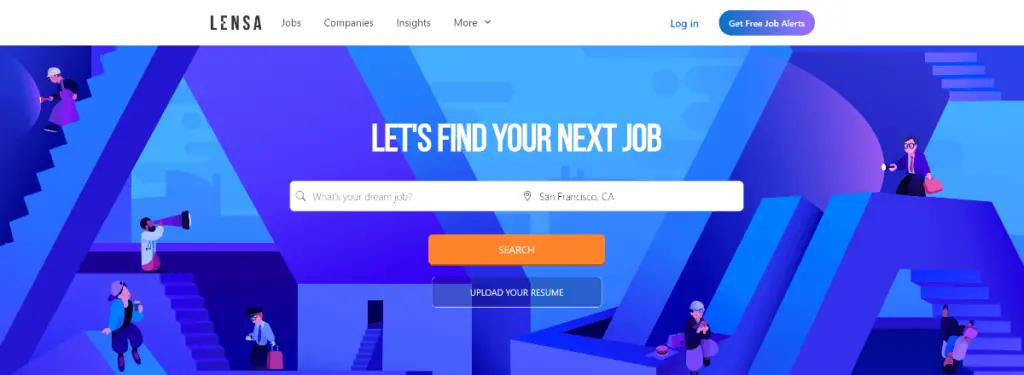
A pioneer in connecting businesses with suitable applicants, Lensa utilizes the latest AI business intelligence to educate job seekers on the most relevant job offers, notify them about the upcoming trends in hiring practices, and offer them insights into alternative career options.
But how does it work? Lensa’s AI technology collects and analyzes historical data from billions of job descriptions, CVs, and job seekers’ work histories to not only find them a role where they will likely be accepted but connect them with roles that will help them climb the ladder in their chosen career path.
A current problem that AI can address is job hopping, where accurate candidate recognition can allow a better company match and greater job satisfaction. Candidates can even play computer games that assess their work style, providing core insight into their strengths, while unlocking career opportunities.
Benefits of Choosing Lensa:
- Completely free for job seekers
- Simple and focused pricing policy
- Recruiters are only charged when they match with a candidate
2. Loxo
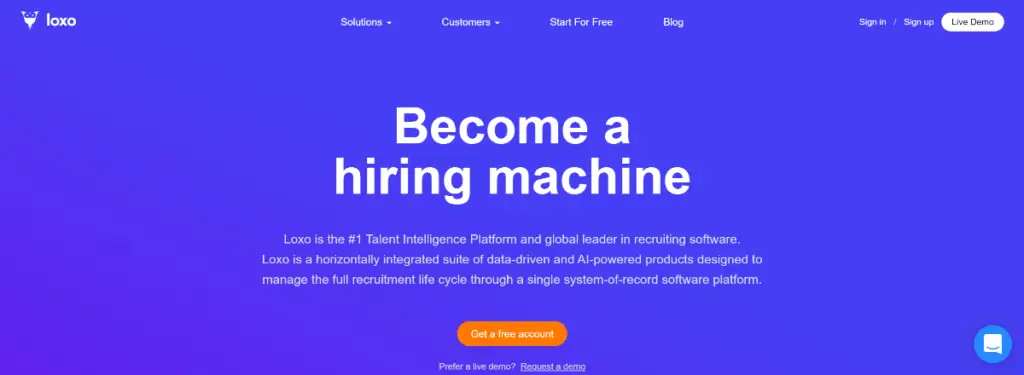
Loxo is known as a talent intelligence platform and specializes in data-driven and AI-powered products developed to manage the entire recruitment life cycle via a single system-of-record software platform.
The platform’s services to help recruiters include an Applicant Tracking System, an AI-driven Recruiting CRM, Candidate Engagement, and a People Search Engine with contact information, including verified mobile phone and personal and work emails.
Benefits of Choosing Loxo:
- Chrome extension to add candidates from LinkedIn, Indeed, and GitHub
- Sourcing automation
- Supports a CRM
3. Paradox by Olivia
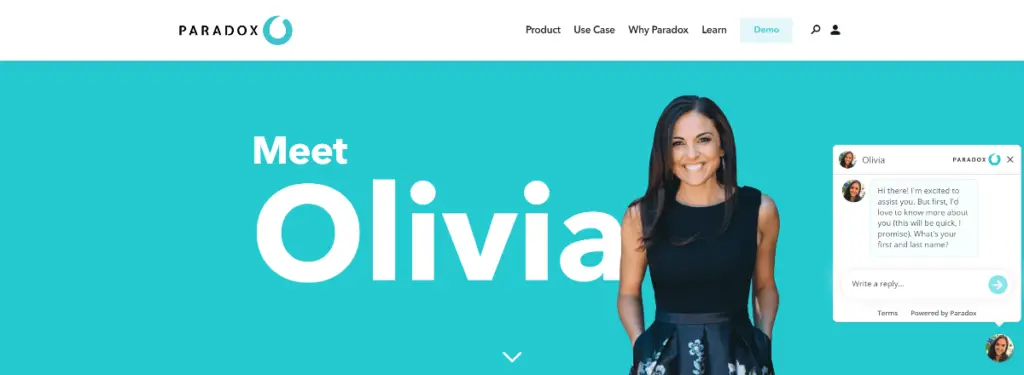
Inspired by a world where artificial intelligence empowers hiring decision makers to be able to spend time with people, not software, Paradox created Olivia, an AI-powered recruiting assistant. Designed to help make the recruitment process faster and smoother, Olivia assists companies in capturing and screening applicants, answering any questions they may have 24/7 (available on any device), and automating the back-and-forth of interview scheduling, among other features.
Benefits of Choosing Paradox:
- Candidate concierge who provides immediate answers to thousands of applicant questions
- Captured applicant information and candidate screening
- Multi-location interviews
4. Humanly.io
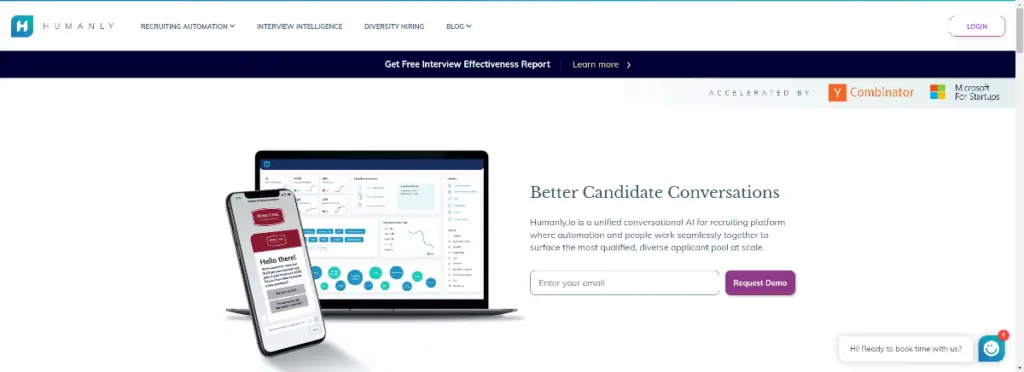
The future of employment for high-volume hiring and retention is changing rapidly, with automation playing a huge part. Humanly.io realized the importance of direct candidate and employee conversation and created a unified recruiting platform powered by AI where automation and people work efficiently together to surface the most suitable, diverse applicant pool at scale. Humanly.io’s conversational AI bridges automated interactions, voice technology, and integrated systems at each stage of the applicant and employee lifecycle.
Benefits of Choosing Humanly:
- Chat for Screen & Schedule
- Chat for Re-engage & Reference checks
- Chat for Reference checks
5. HireVue
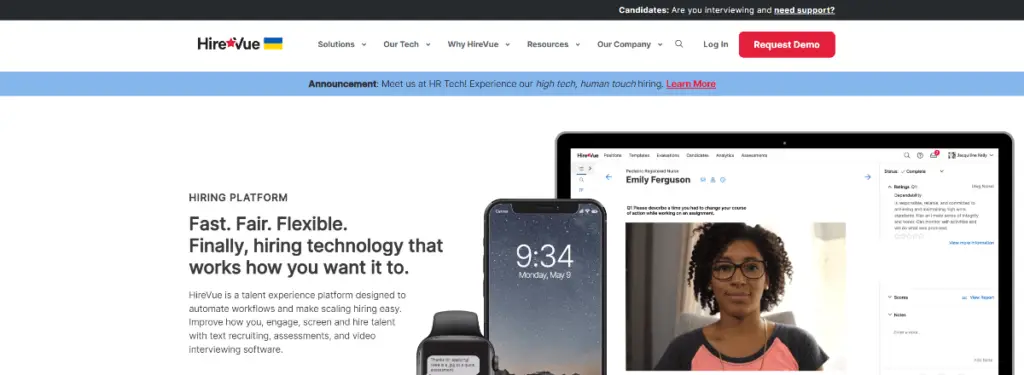
HireVue is a hiring intelligence platform that helps companies discover, hire and develop talent. By integrating video interviews with predictive, validated occupational science and artificial intelligence (AI), this platform enhances human decision-making in the recruiting process in order to deliver quality talent faster and more efficiently with personalized support for both applicants and hiring decision-makers.
Benefits of Choosing HireVue:
- Recruitment, assessment, and candidate management
- Individual development plans
- Resume search and recruiting firms
See Also: How to Motivate Employees as a Leader
Artificial Intelligence Is the Way Forward
Artificial intelligence is definitely a proven tool to improve KPIs, such as time to hire, cost per hire, and most importantly, the quality of employment and the hiring experience for recruiters and HR teams. It will radically change the talent resourcing process along with the job market.
Still, it’s important to note that it can never work alone. It will always require a human contribution to interpret its findings and add a personal element to the recruiting process for a flawless candidate experience.
Talent acquisition has always been a real challenge. But by utilizing AI recruitment tools, employers can make the process more efficient and find the talent that suits their business the best, boost candidate engagement, reduce hiring bias, and speed up the hiring process.
The examples highlighted in the article above only represent a few ways recruitment intelligence-backed technologies such as AI and machine learning are transforming the hiring landscape. There’s much more in store for HR and recruiting teams on this front in the coming years, and AI-powered technologies are certainly here to stay.





